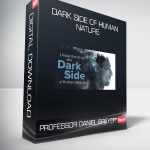Professor Daniel Breyer – Dark Side of Human Nature
Original price was: $234.00.$52.00Current price is: $52.00.
In the 24 lectures of Understanding the Dark Side of Human Nature, Professor Daniel Breyer takes you on a fascinating philosophical journey into some of the File size: 7.02 GB
- Description
- Reviews (0)
Description
Professor Daniel Breyer – Dark Side of Human Nature
You don’t consider yourself evil, do you? Of course not! No one does. And yet, the world is full of violence and suffering. We hear the stories in the news. We see the images online. We know too well how bad things can be, but if we’re sure of anything, we’re sure that we’re not like those who do evil. But what makes us so sure? It’s an uncomfortable question, but how different are we, really? Is it possible that we actually share something in common with those who’ve done the worst humanity has to offer? After all, we’re all human. Aren’t we?
In the 24 lectures of Understanding the Dark Side of Human Nature, Professor Daniel Breyer takes you on a fascinating philosophical journey into some of the deepest—and darkest—questions that have haunted humanity for millennia. In exploring the dark side of human nature, you won’t just explore what it means to be evil; you’ll explore humanity’s fragile underbelly by investigating such topics as our thirst for vengeance, our tendency toward anger, our inability to do what we know is right, and much more. These are difficult topics, to be sure, and at least for some people, it would be easier to look away, rather than investigate them. But the truth is that unless we honestly confront who we are in all its sordid glory, we’ll never fully understand ourselves. We’ll never fully appreciate who we really are—or who we might ultimately become.
Get Professor Daniel Breyer – Dark Side of Human Nature download
A Cross-Cultural Approach
Thinkers from across the world and in many different eras have considered the dark side of human nature, and that’s why this course will adopt a cross-cultural approach, investigating perspectives from many different traditions—from the Hindu Bhagavad Gita and the Buddhist Way of the Bodhisattva to the Christian Bible and the scholarship of contemporary philosophers and psychologists. In this course, you won’t just find yourself seeking answers to some of life’s biggest questions—you’ll also discover entirely new ideas from traditions you’ve not yet encountered.
This multi-cultural approach will help you see humanity from many perspectives, providing a wider opportunity for you to find your own answers. With Professor Breyer’s expert guidance, you will engage with a wide range of great thinkers, including:
- Confucian philosopher Mencius;
- Doaist thinker Zhuangzi;
- Stoic philosopher Seneca;
- Christian theologian Augustine of Hippo;
- Buddhist monk and scholar Shantideva (or Śāntideva);
- Existentialist thinker Albert Camus;
- English philosopher Miranda Fricker;
- American psychologist Paul Bloom; and many more.
Fascinating Questions
This course is fueled by the power of questions, one of philosophy’s most potent tools. Some are questions we have all asked ourselves: Why are people violent? Is anyone just born evil? Why is there so much suffering in the world? We might ask these questions with a certain level of cynicism, or perhaps sadness, not even expecting a real answer, but philosophers have taken these fundamental questions seriously for thousands of years. Mining insights from many different philosophical traditions, Professor Breyer provides some fascinating responses to these and many other dark questions, while offering guidance on how to build flourishing and meaningful lives in the face of darkness
As you’ll discover, confronting the dark side of human nature is sometimes messy. You won’t find every point of view completely satisfying, and sometimes you won’t even know which arguments to believe, but you will be constantly engaged in an ongoing conversation with an expert guide whose goal is to help you think for yourself and reach your own answers to difficult questions like these:
- If someone does something evil, does that mean they’re an evil person?
- What does it say about us if we do something awful in our dreams?
- Is it rational to fear death?
- Do we live in a just world, where victims are to blame for their own suffering?
- Can anything good come from painful emotions like anger and grief?
- Is there something wired into human nature that drives us to kill others?
- Is anyone ever beyond redemption or forgiveness?
- With so much suffering in the world, how can we create meaningful lives?
Exploring the Dark Side through Stories and Thought Experiments
Stories and thought experiments are powerful, and that’s why thinkers from many different traditions have used them to explore difficult questions. In Understanding the Dark Side of Human Nature, you will encounter fascinating thought experiments and stories—some fictional, some drawn from the headlines—that concretize abstract ideas and help us find meaning in our own lives.
Among many others, you will explore:
- Gyges’ Ring. Plato tells of Gyges, a man who found a ring that could make him invisible. With help from this newfound power, he seduced the king’s wife, killed the king, and took over the entire kingdom. If we had a mechanism for escaping punishment, would we honestly live a just life, or one that took us to the dark side?
- Zen Parable of the Two Brothers. Two brothers were shopping when they noticed an aging woman who needed help. The older brother carried her and her bags to her car. The younger brother was upset the woman hadn’t said, “Thank you,” and he brought that up again and again later in the day. The older brother responded, “Little brother, I set that woman down hours ago. Why are you still carrying her?” Why do we have a craving for things to go a particular way and allow ourselves to be distraught when they don’t?
- A Mother’s Grief. In a famous Buddhist story, a woman loses her baby and becomes overcome with grief, looking for medicine that could bring him back to life. The Buddha says he will help if she can find a pinch of mustard seed from a household untouched by the suffering of death. She finds the spice easily enough, but every household shares a story about a loved one lost. Is it possible that grief, one of our darkest emotions, is valuable to us, as we learn positive lessons about life and the need for community?
- The Luck of the Two Partygoers. Two people attend a party, drink beyond the point of legal intoxication, get in their separate cars to drive home, lose control of their cars, and swerve onto the sidewalk. In one case, a man standing on that sidewalk is killed. In the other, the sidewalk was empty. Both partygoers broke the law by driving while intoxicated. Should we judge them the same, or differently? How can we take responsibility for our actions, but recognize the role that luck plays in our lives?
These memorable thought experiments and stories, along with many others, will help you wrestle with big ideas and dark questions by grounding them in everyday experience and making them vividly real.
If we really want to understand ourselves and the world around us, we must confront humanity’s dark side. In Understanding the Dark Side of Human Nature, you’ll do just that, while being guided by thinkers from across the world, with whom you’ll engage in a great conversation, as you attempt to find your own answers to life’s biggest—and darkest—questions. What will you do to confront your own dark side? How will you choose to live in this troubled world?
Get Professor Daniel Breyer – Dark Side of Human Nature download





Reviews
There are no reviews yet.